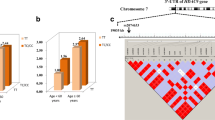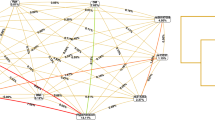Adaptor proteins stress induced phosphoprotein 1 (STIP1) and ST13 Hsp70 interacting protein (ST13) may play a crucial role in the pathophysiology of ischemic stroke through controlling protein folding, neuronal survival, and regulation of HSP70/HSP90. The present pilot study investigated whether tagSNPs in genes encoding ST13 (rs138335, rs138344, rs7290793, and rs138344) and STIP1 (rs4980524) are associated with ischemic stroke. DNA samples from 721 ischemic stroke patients and 471 healthy controls were genotyped using the MassArray-4. Our research revealed a relationship between rs138344 ST13 and the risk of ischemic stroke, which was seen only in females (risk allele G; OR=1.34, 95%CI=1.07-1.69; p=0.01). The haplotype rs138335G-rs138344C-rs7290793C ST13 was linked with lower risk of ischemic stroke in females: OR=0.42; 95%CI=0.26-0.68; p=0.0005. Thus, ST13 represents a novel genetic marker for ischemic stroke.
Similar content being viewed by others
References
Hu C, Yang J, Qi Z, Wu H, Wang B, Zou F, Mei H, Liu J, Wang W, Liu Q. Heat shock proteins: Biological functions, pathological roles, and therapeutic opportunities. MedComm (2020). 2022;3(3):e161. https://doi.org/10.1002/mco2.161
Costa-Beber LC, Hirsch GE, Heck TG, Ludwig MS. Chaperone duality: the role of extracellular and intracellular HSP70 as a biomarker of endothelial dysfunction in the development of atherosclerosis. Arch. Physiol. Biochem. 2022;128(4):1016-1023. https://doi.org/10.1080/13813455.2020.1745850
Xie F, Zhan R, Yan LC, Gong JB, Zhao Y, Ma J, Qian LJ. Diet-induced elevation of circulating HSP70 may trigger cell adhesion and promote the development of atherosclerosis in rats. Cell Stress Chaperones. 2016;21(5):907-914. https://doi.org/10.1007/s12192-016-0716-2
Xu Q, Metzler B, Jahangiri M, Mandal K. Molecular chaperones and heat shock proteins in atherosclerosis. Am. J. Physiol. Heart Circ. Physiol. 2012;302(3):H506-H514. https://doi.org/10.1152/ajpheart.00646.2011
da Fonseca ACC, Matias D, Geraldo LHM, Leser FS, Pagnoncelli I, Garcia C, do Amaral RF, da Rosa BG, Grimaldi I, de Camargo Magalhães ES, Cóppola-Segovia V, de Azevedo EM, Zanata SM, Lima FRS. The multiple functions of the co-chaperone stress inducible protein 1. Cytokine Growth Factor Rev. 2021;57:73-84. https://doi.org/10.1016/j.cytogfr.2020.06.003
Shi ZZ, Zhang JW, Zheng S. What we know about ST13, a co-factor of heat shock protein, or a tumor suppressor? J. Zhejiang Univ. Sci. B. 2007;8(3):170-176. https://doi.org/10.1631/jzus.2007.B0170
Simunovic F, Yi M, Wang Y, Macey L, Brown LT, Krichevsky AM, Andersen SL, Stephens RM, Benes FM, Sonntag KC. Gene expression profiling of substantia nigra dopamine neurons: further insights into Parkinson’s disease pathology. Brain. 2009;132(Pt 7):1795-1809. https://doi.org/10.1093/brain/awn323
Zhang S, Wu D, Wang J, Wang Y, Wang G, Yang M, Yang X. Stress protein expression in early phase spinal cord ischemia/reperfusion injury. Neural Regen. Res. 2013;8(24):2225-2235. https://doi.org/10.3969/j.issn.1673-5374.2013.24.002
Azarova IuE. The relationship between polymorphism rs12449964 of the phosphatidylethanolamine-N-methyltransferase gene and hypertriglyceridemia and obesity in patients with type 2 diabetes. Nauch. Rezult. Biomed. Isseld. 2021;7(3):245-256. Russian. https://doi.org/10.18413/2658-6533-2021-7-3-0-4
Kobzeva KA, Shilenok IV, Belykh AE, Gurtovoy DE, Bobyleva LA, Krapiva AB, Stetskaya TA, Bykanova MA, Mezhenskaya AA, Lysikova EA, Freidin MB, Bushueva OY. C9orf16 (BBLN) gene, encoding a member of Hero proteins, is a novel marker in ischemic stroke risk. Res. Results Biomed. 2022;8(3):278-292. https://doi.org/10.18413/2658-6533-2022-8-3-0-2
Bushueva OYu. Single nucleotide polymorphisms in genes encoding xenobiotic metabolizing enzymes are associated with predisposition to arterial hypertension. Res. Results Biomed. 2020;6(4):447-456. https://doi.org/10.18413/2658-6533-2020-6-4-0-1
Moroni F, Ammirati E, Rocca MA, Filippi M, Magnoni M, Camici PG. Cardiovascular disease and brain health: Focus on white matter hyperintensities. Int. J. Cardiol. Heart Vasc. 2018;19:63-69. https://doi.org/10.1016/j.ijcha.2018.04.006
Rastogi A, Weissert R, Bhaskar SMM. Emerging role of white matter lesions in cerebrovascular disease. Eur. J. Neurosci. 2021;54(4):5531-5559. https://doi.org/10.1111/ejn.15379
Nakamura T, Hinagata J, Tanaka T, Imanishi T, Wada Y, Kodama T, Doi T. HSP90, HSP70, and GAPDH directly interact with the cytoplasmic domain of macrophage scavenger receptors. Biochem. Biophys. Res. Commun. 2002;290(2):858-864. https://doi.org/10.1006/bbrc.2001.6271
Madrigal-Matute J, Martin-Ventura JL, Blanco-Colio LM, Egido J, Michel JB, Meilhac O. Heat-shock proteins in cardiovascular disease. Adv. Clin. Chem. 2011;54:1-43. https://doi.org/10.1016/b978-0-12-387025-4.00001-7
Simunovic F, Yi M, Wang Y, Stephens R, Sonntag KC. Evidence for gender-specific transcriptional profiles of nigral dopamine neurons in Parkinson disease. PLoS One. 2010;5(1):e8856. https://doi.org/10.1371/journal.pone.0008856
Author information
Authors and Affiliations
Corresponding author
Additional information
Translated from Byulleten’ Eksperimental’noi Biologii i Meditsiny, Vol. 176, No. 10, pp. 477-481, October, 2023
Rights and permissions
Springer Nature or its licensor (e.g. a society or other partner) holds exclusive rights to this article under a publishing agreement with the author(s) or other rightsholder(s); author self-archiving of the accepted manuscript version of this article is solely governed by the terms of such publishing agreement and applicable law.
About this article
Cite this article
Stetskaya, T.A., Krapiva, A.B., Kobzeva, K.A. et al. Polymorphism in Genes Encoding Adaptor Proteins ST13 and STIP1 and the Risk of Ischemic Stroke: a Pilot Study. Bull Exp Biol Med 176, 477–480 (2024). https://doi.org/10.1007/s10517-024-06050-x
Received:
Published:
Issue Date:
DOI: https://doi.org/10.1007/s10517-024-06050-x




